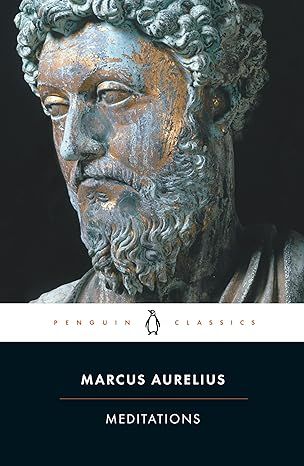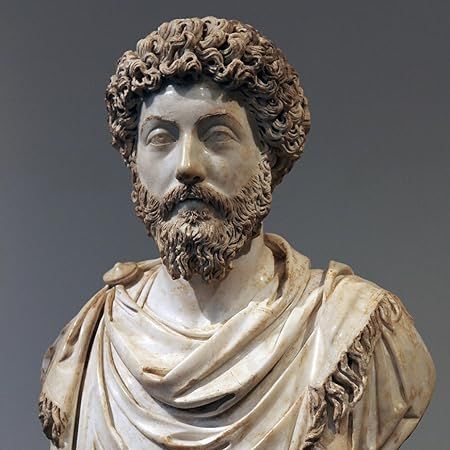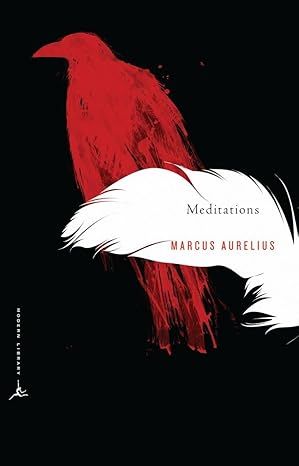Meditations (Penguin Classics)
4.8 out of 5
8,065 global ratings
A clear and eloquent leading translation of the Roman emperor’s reflections of human life and death, timeless Stoic philosophy that inspires countless others including The Daily Stoic author Ryan Holiday to use philosophy as a tool for self-improvement and resilience to live a better life
Written in Greek by an intellectual Roman emperor without any intention of publication, the Meditations of Marcus Aurelius offer a wide range of fascinating spiritual reflections and exercises developed as the leader struggled to understand himself and make sense of the universe. Spanning from doubt and despair to conviction and exaltation, they cover such diverse topics as the question of virtue, human rationality, the nature of the gods and the values of leadership. But while the Meditations were composed to provide personal consolation, in developing his beliefs Marcus also created one of the greatest of all works of philosophy: a series of wise and practical aphorisms that have been consulted and admired by statesmen, thinkers and ordinary readers for almost two thousand years.
To provide a full understanding of Aurelius's seminal work, this edition includes explanatory notes, a general index, an index of quotations, an index of names, and an introduction by Diskin Clay putting the work in its biographical, historical, and literary context, a chronology of Marcus Aurelius's life and career.
Penguin Classics is the leading publisher of classic literature in the English-speaking world, representing a global bookshelf of the best works throughout history and across genres and disciplines. Readers trust the series to provide authoritative texts enhanced by introductions and notes by distinguished scholars and contemporary authors, as well as up-to-date translations by award-winning translators.
304 pages,
Kindle
Audiobook
Paperback
First published October 30, 2006
ISBN 9780140449334
About the authors
Marcus Aurelius
Marcus Aurelius Antoninus was born to an upper-class Roman family in A.D. 121 and was later adopted by the future emperor Antoninus Pius, whom he succeeded in 161. His reign was marked by a successful campaign against Parthia, but was overshadowed in later years by plague, an abortive revolt in the eastern provinces, and the deaths of friends and family, including his co-emperor Lucius Verus. A student of philosophy from his earliest youth, he was especially influenced by the first-century Stoic thinker Epictetus. His later reputation rests on his Meditations, written during his later years and never meant for formal publication. He died in 180, while campaigning against the barbarian tribes on Rome’s northern frontier.
Read more
Reviews
Lirp
5
Good book
Reviewed in the United States on August 8, 2024
Verified Purchase
Nice
2 people found this helpful
Creative Reviews
5
Almost 2000 Years Old and Eerily Accurate to Todays World
Reviewed in the United States on October 15, 2023
Verified Purchase
Synopsis: This is a book that everyone needs to read. This is the personal diary of the most important man in the Roman empire at the time it was written. This is the equivalent of being able to read the personal diary of todays world leaders, or top CEO's and understand their motivations and philosophies. This book does not take long to read, and you can plow through it in about a week with roughly 30 minutes of reading each day. Due to Marcus' philosophy, he does not use pretentious language, so the book is consumable by a wide audience. Overall, this book is certainly worth the read and it will change how you look at the world, yourself and your actions.
The Book: Marcus was born in 121 AD and died in 180 AD, making his writings ~1,800 years old at the time of this review. Mediate on that for a bit...you're reading the personal diary from a Roman emperor who died almost 2000 years ago. We are incredibly privileged to be able to read such a historical masterpiece. The introduction from the translator is quite long, to the degree that I skipped it as he was consistently making references to the text, of which, I had not read yet. Mediations makes up the minority of the pages, with the majority being the introduction, then the rest being explanations of each verse. The explanations can be helpful in explaining the historical context.
Here's a few heavily summarized topics discussed in the book as a preview:
On Perception: Marcus made it his mission to look at the world objectively and for what it truly is, free of personal opinion or emotion. As long as what you were experiencing was within the bounds of what could be expected within the life of a human, it was your perception that made it pleasurable or painful. You could then change your perception on the issue and improve your life.
On Religion: Despite being polytheistic, his philosophy on nature centers heavily on a type of worship of Gaia, coming very close to exalting her above Zeus. This is a very fine line he dances, always placing his trust in the Gods who had his best interest at heart, but also blending his knowledge of the natural world. Another peculiarity is that he frequently uses God in the singular form.
On Nature: Nature has everyone and everything performing a specific task which contributes to the whole. To determine if something is good or bad, Marcus asks himself if it would harm the wider society. To illustrate, here is a quote from Marcus, "That which is not good for the beehive cannot be good for bees".
On Time: Close to the end of the book, and to Marcus' death, he begins to reflect on his time spent on the earth. Marcus discusses how events repeat themselves and that 40 years of studying the natural world is enough. This is an extremely profound realization, since the reader can draw many parallels from his life, to our modern lives. He makes the bold claim that things never change, and time has proved him right. Marcus eventually died at 58 years of age.
Read more
46 people found this helpful
Amazon Customer
5
Full of wisdom
Reviewed in the United States on July 20, 2024
Verified Purchase
I am just starting the book,but I’m learning something new on every page.
6 people found this helpful
matt
5
A must read
Reviewed in the United States on September 29, 2024
Verified Purchase
A must read for those that wise to dilate the kings eye
Twilight's Pool
5
Mind of strong man
Reviewed in the United States on September 20, 2024
Verified Purchase
No women thoughts here, masculinity is order. A must read for men.
3 people found this helpful
TG of Trinidad
5
The best book
Reviewed in the United States on July 16, 2024
Verified Purchase
I can't stop coming back to this book for wisdom! Must read and meditate lol.
2 people found this helpful
John
5
A good read to prove humans don't change
Reviewed in the United States on July 19, 2024
Verified Purchase
Read it. I treated it as a Bathroom book and it's helped me to understand that even a few hundred years later, humans are the same.
2 people found this helpful
Greg Taylor
5
Some thoughts on translations and on Marcus Aurelius.
Reviewed in the United States on July 27, 2009
Verified Purchase
What makes Meditations an important book is that it provides the opportunity to discuss what it is to be human, to have a soul, to live a good life with one of the most remarkable men in history. Before I get to that I want to second a suggestion made by several reviewers. Use two or more translations when you read the Meditations. I like this Penguin Classics edition. The introduction by Diskin Clay is useful, the translation by Martin Hammond is mostly accurate and his explanatory notes are very useful. There are some solid suggestions for further reading and several useful indices (of Names, of Quotations, and a General Index). My one qualm about the translation is that Hammond sometimes makes the book sound a little Christian. Hammond will use "sin" where other translators (like Farquharson or Frances Hutchinson) would use "impiety" or "harm". This is decidedly not a Christian text. There is nothing in Marcus Aurelius (MA) of final judgment. There is no reward or punishment for our actions in this life. MA suspends judgments on all sorts of issues. It is clear that he believes in gods and occasionally talks about God (see 12.2). But he also mentions many times the alternative belief that all is chance and that death will be followed by oblivion. It is essential to his ethics however that death is not followed by any sort of hell. Also worth thinking about is whether MA is a man whose philosophy is to be rejected (or, at least, radically modified) because it ultimately makes one less human. With MA, everything is to be thought through with the corrosive that is reason. We must not let our attachments cause us to lose sight of the truth. We may kiss our children good night but we must remind ourselves as we are doing so that they could be dead tomorrow (11.34 in Meditations- this bit of choice advice came from Epictetus)! One point about this is that there is a real conflict in MA with his idea that we should accept everything that the gods see fit to visit upon us (an idea expressed too many times to quote a single source) and his desire to not be effected by any of it. I would argue that true acceptance does not seek invulnerability. True confront embraces vulnerability and fully accepts the whole of our humanity. We have a choice about how we respond to our suffering. MA, at his best, is saying that and pointing out that we can not let our suffering control our actions. At his worst, he sometimes seems to be saying that we can chose not to feel our suffering. He is such a compelling writer that I think it is all too easy to read MA in a way that avoids how radical are some of his ideas. The desire of MA for some sort of emotional invulnerability is part and parcel of his rejection of quotidian experience. He does not seem to have liked or admired many of his contemporaries and he does not seem fond of the simple pleasures of life. His descriptions of sexuality are always mingled with tones of disgust. Where the Meditations may be most useful is when we are dealing with some sort of very extreme situation. There are two Naval Academy essays by John Stockdale about how he survived his imprisonment during the Vietnam War using the philosophy of Epictetus that delve into the full complexity of that philosophy. (These essays are referenced in the intro to the Penguin edition of Epictetus' writings. You can use the Amazon preview of that book to see the reference.) Does all this mean that I think you should not immediately run out and buy a copy of this book? NO, NO, a thousand times, NO. The Meditations is one of those few books that everyone should read for help in working out their own philosophy. We all have to come to grips with how we want to live our own lives, what values we want to honor and MA is one of the writers who will help you work that out. He belongs in the company of St. Augustine, of Montaigne, of Machiavelli, of Plato, and of the Buddha (among many others- this list is mine own). So, yes, read MA in the Hammond translation by all means. Remember that he wrote this book so that he would have constant and personal reminders to live up to his own philosophy. By reading this book, you may come to some understanding of what it would be like to live up to your own philosophy.
Read more
163 people found this helpful
brianpowell
4
Meditation Marcus Aurelius
Reviewed in the United States on April 1, 2024
Verified Purchase
The content in the book is priceless, the book condition gets the minus. Seller needs to clarify the book is New but damaged. Once again the information in the book priceless the packaging and description of the book is not great.
Luke T
3
Roughed up, seems more like used
Reviewed in the United States on September 5, 2024
Verified Purchase
Corners and edges are scrunched and weathered, not well packaged. Overall quality is less than what this line of books was recently.
Top Marcus Aurelius titles
Best Sellers

The Tuscan Child
4.2
-
100,022
$8.39

The Thursday Murder Club: A Novel (A Thursday Murder Club Mystery)
4.3
-
155,575
$6.33

Sapiens: A Brief History of Humankind
4.6
-
140,302
$13.49

The Butterfly Garden (The Collector, 1)
4.3
-
88,556
$9.59

Things We Hide from the Light (Knockemout Series, 2)
4.4
-
94,890
$11.66

The Last Thing He Told Me: A Novel
4.3
-
154,085
$2.99

The Perfect Marriage: A Completely Gripping Psychological Suspense
4.3
-
143,196
$9.47

The Coworker
4.1
-
80,003
$13.48

First Lie Wins: A Novel (Random House Large Print)
4.3
-
54,062
$14.99

Mile High (Windy City Series Book 1)
4.4
-
59,745
$16.19

Layla
4.2
-
107,613
$8.99

The Locked Door
4.4
-
94,673
$8.53


